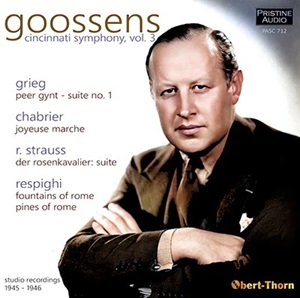
Sir Eugene Goossens (conductor)
Cincinnati Symphony, Volume 3
Edvard Grieg (1843-1907)
Peer Gynt Suite No 1, Op 46 (1874/88)
Emmanuel Chabrier (1841-1894)
Marche Joyeuse (1888)
Richard Strauss (1864-1949)
Suite from Der Rosenkavalier (1909-10) arr Antál Doráti
Ottorino Respighi (1879-1936)
Fountains of Rome (1916)
Pines of Rome (1924)
rec. 1945 and 1946, Cincinnati Music Hall
Pristine Audio PASC712 [74]
This is the third and final volume of a series that has collected all Eugene Goossens’ Cincinnati Symphony recordings, the orchestra he led between 1931 and 1946. It had been directed by Fritz Reiner for about a decade before Goossens’ arrival, so it was hardly a hick operation when he took over, as one can plainly hear. It wasn’t up to the standard of the Big Five, but most orchestras would have struggled to match their standards at the time in question. Goossens certainly got the very best from his forces and RCA Victor recorded them well in the Cincinnati Music Hall. The recordings in this final release date from 1945-46, the very end of Goossens’ tenure.
Placing the recordings in chronological order of recording is welcome, but it means starting with Grieg’s Peer Gynt Suite No 1. It’s by no means a poor recording and Goossens was always too good a conductor to turn in a routine performance. But compared to the LPO recording of his old colleague and friend, Thomas Beecham, this is a rather innocuous affair, lacking in the vibrancy, vivacity and sense of colour engendered by Beecham. The LPO comprehensively outplays the Cincinnati orchestra as well. Chabrier’s Marche Joyeuse is a decent performance too but, once again, stack it up against Beecham’s RPO recording made a couple of years after Goossens’ and you’ll find an altogether zippier and more colourful performance drenched in panache. In comparison, the limitations of Goossens’ recording make themselves apparent.
Still, Chabrier’s four-minutes is not going to make or break things. Of far greater significance is the recording of Antál Doráti’s Suite from Der Rosenkavalier. This potpourri was not as well-known as Strauss’ own suite, which was recorded by Barbirolli at around the same time that Goossens was recording the Doráti. Goossens directs a direct, no-nonsense performance which would have satisfied those unable or unwilling to see the work on stage and who wouldn’t have invested the time listening to the work over the radio.
Respighi’s Fountains of Rome was recorded in 1945, but not issued on 78s. It eventually appeared on an obscure limited-edition LP. Mark Obert-Thorn conjectures that this and the Pines of Rome were intended to be brought out on a four-disc set, but only the latter was issued two years after Goossens had left Cincinnati. Maybe that’s so regarding the 4-album release, but it suggests a strong unease on RCA’s part. John Barbirolli had already recorded the Fountains for Victor in 1939 with the New York Philharmonic-Symphony, a notably intense account. Perhaps RCA’s unease about the Cincinnati recording was compounded by the existence of de Sabata’s Berlin Respighi recordings made in 1939 as well, which would have been available in America as imports. Maybe RCA had even had wind of the 1947 Fountains de Sabata made with the Santa Cecilia Orchestra in Rome and decided quietly not to release Goossens’ recording for reasons of too much competition. Still, Goossens was a good Respighi conductor as he showed when he remade Fountains for HMV and added Feste Romance on Everest, though he was hardly in de Sabata’s class.
The transfers are excellent, and the series is valuable for restoring all Goossens’ Cincinnati recordings.
Jonathan Woolf
Availability: Pristine Classical

















